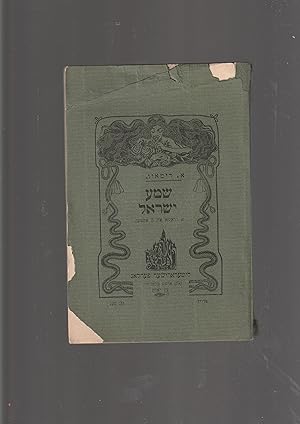Descripción
In Yiddish. 48 pages. 195 x 130 mm. Chipped wrappers. Printed on high quality paper. WorldCat: Libraries worldwide that own item: 1. OSIP DYMOV was the pseudonym of Yoysef Perelman. He was born in Bialystok, Poland, into a semi-assimilated family. His mother was a teacher of foreign languages. He studied in the Bialystok high school. He graduated in 1894 from the Forestry Institute in St. Petersburg. He began his literary activities in 1892 with humorous sketches in the Russian provincial press. He gained a name for himself with his ingenious feature pieces and humorous sketches at the time of the first Russian Revolution, when Russian humor journals, such as Signali (Alarms), sprang up. He wrote a short essay in 1894, entitled "?Der eybiker vanderer" (The eternal wanderer). He later reworked it into a drama with the same title, which was staged in the best theaters in virtually the entire world and in many languages. From 1906 he was a standing contributor to the largest, Russian, progressive newspapers, such as: Svobodnaia mysl (Free thought), Utro (Morning), Rus (Russia), and Satirikon (Satyricon). He was also writing under the pen name "Kin." In 01905 he published an anthology of symbolist stories, Solntsevorot (Sun cycle) (St. Petersburg), 169 pp., which would appear in a number of editions; in 1908, his collection Zemlya svetet (The earth blossoms) (Moscow), 122 pp.; in 1910, Beselaia pechal, yumoristicheskie razskazy (Joyous sadness, humorous stories) (St. Petersburg), 210 pp.; in 1911, Razskazy (Stories) (St. Petersburg); and the like. From 1907 he began writing in Yiddish and contributed to Roman-tsaytung (Fiction newspaper) in Warsaw. In 1907 he composed his play Slushay, Izrail! (Hear, O Israel!), translated into Yiddish by A. Goldring (Warsaw, 1907), 48 pp., in which he introduced using bold action Jewish suffering during pogroms in Tsarist Russia. The drama was well received by the Jewish and the Russian public while it was playing on the Russian and Jewish stage. It was translated into Hebrew by Pesa? Kaplan and staged, under the direction of Na?um Tsema?, by the Bialystok?s "Habima beivrit" (Habima in Hebrew). Particularly successful was his play Kazhdyi den? (Every day) which was staged in Russia and in Europe, and also in film. Also, his second play about Jewish loss of rights, Der eybiker vanderer, in three acts, with a prologue (St. Petersburg, 1913) appeared in Yiddish (Warsaw, 1928), 66 pp., and had a strong nationalist tenor, but was tendentious and not sufficiently absorbing, and yet had a major impact. The well-known American Yiddish actor and theater director Boris Tomashevsky, while performing in a guest role in Lodz, watched a performance on the Russian stage of Der eybiker vanderer, and he invited Dymov to the United States where he had in that very year staged the play in his own theater (translated by Dr. A. Mukdoni). This had the effect of bringing Dymov generally closer the Yiddish stage, language, and literature. Der eybiker vanderer was translated into Hebrew in 1912 and was staged by Tsema? at Habima. Dymov was living from that point in time in the United States, where he was active in the realm of theater and literature. He published hundreds of stories, human interest pieces, and humorous sketches in Tog (Day), Kundes (Prankster), and elsewhere. His two volumes of memoirs, entitled Vos ikh gedenk (What I remember) (vol. 1: New York, 1943, 345 pp.; vol. 2: New York, 1944, 311 pp.), in which he describes his life until WWI, were initially published serially in Forverts (Forward) in New York. Dymov was thoroughly devoted to the stage. . . . N° de ref. del artículo 014902
Contactar al vendedor
Denunciar este artículo
![]()
